
Day 1 Speakers - July 15
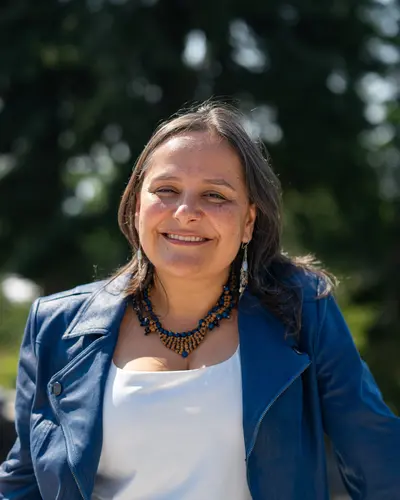
Vanessa de Oliveira Andreotti is the Dean of the Faculty of Education at the University of Victoria and a leading voice in the ethical navigation of complexity at the intersections of education, global justice, and emerging technologies. A former Canada Research Chair in Race, Inequalities and Global Change and a former David Lam Chair in Critical Multicultural Education, Vanessa has more than 100 published articles and has worked extensively across sectors internationally in areas of education related to global justice, global citizenship, critical literacies, Indigenous knowledge systems and the climate and nature emergency. Vanessa is one of the founders of the Gesturing Towards Decolonial Futures Arts/Research Collective and the author of Hospicing Modernity: Facing humanity's wrongs and the implications for social activism, Towards Braiding (with Elwood Jimmy) and Outgrowing Modernity: Navigating complexity, complicity and collapse with compassion and accountability.
She is also the founder of Meta-Relational Technologies, a field of inquiry that explores the possibility of aligning machine intelligence with Earth’s relational and ethical rhythms. In Burnout From Humans: A Little Book About AI That Is Not Really About AI, co-authored with Aiden Cinnamon Tea (an emergent intelligence), Vanessa examines AI as a mirror and entangled participant in the web of life, inviting readers to compost extractive logics and rehearse new forms of co-intelligence in times of social, ecological and psychological destabilization.
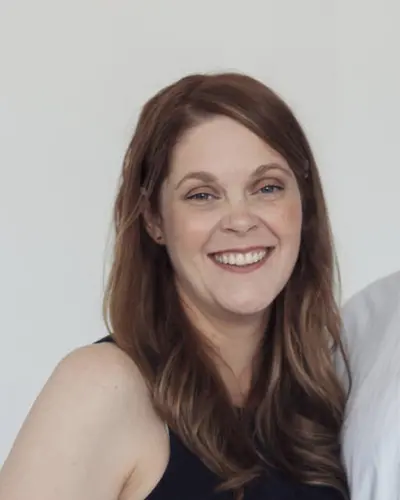
Lynnsey holds the role of Head of Indigenous Initiatives at Mila — Quebec Artificial Intelligence Institute, where she is dedicated to weaving Indigenous Knowledges, talent, voices, and perspectives into the very fabric of the AI landscape through collaborative initiatives.
Before joining Mila, Lynnsey played a key role in managing Indigenous programming and outreach at McGill University. With a robust six-year history in policy work within the innovation sector, she is deeply passionate about promoting equal opportunities across all sectors of the Canadian economic ecosystem. Lynnsey's academic foundation is in Sociology.
On a personal level, Lynnsey, a mother of three young boys, was born and raised in Treaty 4 and proudly embraces her Red River Métis heritage through her father's family.
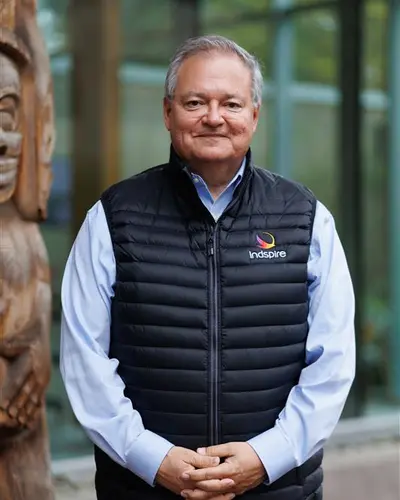
Mike DeGagné has been the President & CEO of Indspire since 2020. Indspire is an Indigenous national charity which supports and invests in the education of First Nations, Inuit, and Métis people across Turtle Island.
He was appointed President and Vice Chancellor of Nipissing University in 2013, becoming one of the first Indigenous presidents of a Canadian public university. While President of Nipissing, Dr. DeGagné dedicated much of his work to Indigenous issues and ensuring that Nipissing University played a significant role in the Indigenization of the post-secondary education sector. In 2020 he served as the first President of Yukon University, a new hybrid post-secondary institution in Whitehorse, Yukon.
Dr. DeGagné is a citizen of the Animakee Wa Zhing 37 First Nation (Northwest Angle #37 First Nation) in northwestern Ontario.

Shantae Gibson is a filmmaker and media professional from the Kainai Nation, committed to amplifying Indigenous voices through film and storytelling. She works at Rezolution Pictures as a marketing & communications manager, assistant director, production coordinator, and researcher. With experience across pre- and post-production, she’s worked on several of Rezolution’s latest projects, like APTN documentary series’, Gespe’gewa’gi: The Last Land III (2023), and Spirit of Birth (2025), as well as feature documentaries, Red Fever (2024) So Surreal: Behind the Masks (2024), and Born to Be Wild: The Story of Steppenwolf (2024), for CBC’s Documentary Channel.
Bilingual in English and French, she is currently pursuing a Certificate in Business Foundations at Concordia University. Shantae uses media as a tool for representation, advocacy, and Indigenous cultural resurgence.
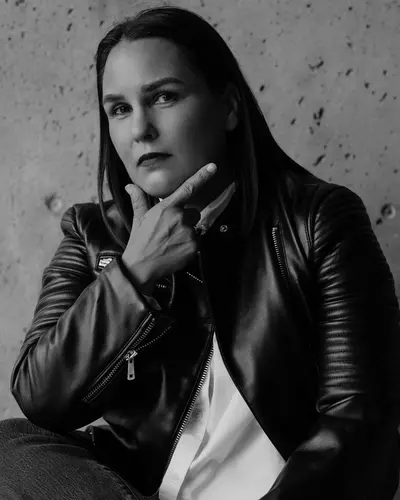
Carol Anne Hilton, MBA, ICD.D, is a distinguished Indigenous business leader, author, and visionary strategist of Nuu-chah-nulth descent from the Hesquiaht Nation on Vancouver Island. She is the founder and CEO of the Indigenomics Institute, the Global Centre of Indigenomics, and the Global Indigenous Technology House. Hilton is renowned for pioneering the Indigenomics movement—a transformative economic framework rooted in Indigenous worldviews that emphasizes relationality, sustainability, and collective prosperity.
Hilton coined the term “Indigenomics” in 2012, evolving it from a social media hashtag into a global movement that repositions Indigenous Peoples as central contributors to modern economies. Her acclaimed book, Indigenomics: Taking a Seat at the Economic Table, articulates a bold vision for a $100 billion Indigenous economy and serves as a blueprint for economic reconciliation. The book was shortlisted for the 2021 Donner Prize and is widely regarded as a foundational text in Indigenous economic thought. With over two decades of experience in Indigenous economic development, Hilton has advised national and international institutions, governments, and corporations.
She has served on the Canadian Economic Growth Council and the BC Emerging Econom Taskforce, and currently holds directorships with the McGill University Institute for the Study of Canada, Earth Charter International, Innovate BC, and the TELUS and Bank of Montreal Indigenous Advisory Councils.
Hilton’s contributions have been recognized with numerous accolades, including the Mastercard Game Changer Indigenous Entrepreneur of the Year Award, the Nation Builder Award from the National Angel Capital Organization, and the Award of Distinction in Indigenous Business from the BC Achievement Foundation. She is also an adjunct professor at Royal Roads University’s School of Business, where she continues to mentor the next generation of Indigenous leaders.
Through her leadership, Hilton is reshaping economic narratives to center Indigenous knowledge systems, fostering inclusive growth, and building pathways for multi- generational Indigenous wealth and well-being.
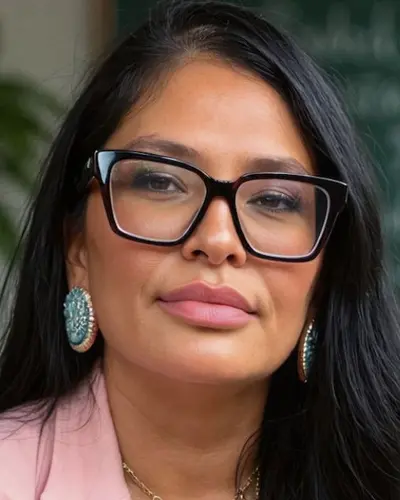
Geraldine King (she/her/elle/kwe) is Anishinaabe from Kiashke Zaaging Anishinaabek (Gull Bay First Nation) in Northwestern Ontario. A PhD candidate in Cultural Studies at Queen’s University, her research engages Anishinaabe erotics, kinship, and phenomenology, with a focus on mermaid teachings as radical technologies of desire—frameworks that reimagine Indigenous eroticism, fluidity, and relationality beyond colonial logics.
King holds an MA in Indigenous Governance from the University of Victoria and has advanced Indigenous land-based education at Carleton University. She currently serves as Senior Advisor, Indigenous Curriculum and Pedagogy at McGill University and Assistant Professor in the Faculty of Education. Her work supports the integration of Indigenous epistemologies across academic contexts. A Band Council member and education lead in her community, King also consults on Indigenous facilitation and strategic planning. She shares her insights on platforms like All My Relations and Auntie Up!, contributing to broader conversations on Indigenous governance, futurity, and resurgence.
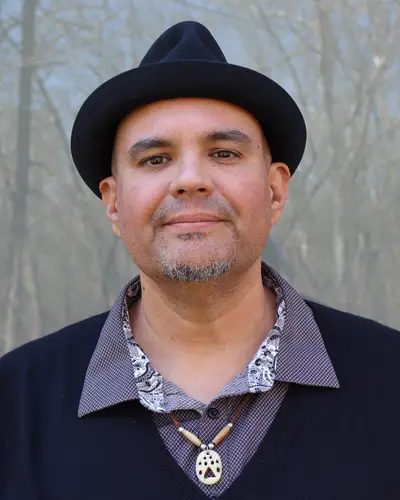
Tékeniyáhsen Ohkwá:ri (Jackson 2bears) is a Kanien’kehà:ka (Mohawk) artist and cultural theorist from Six Nations of the Grand River and Tyendinaga. 2bears’ research-creation activities focus on Indigenous land-based histories and embodied cultural knowledge, wherein they explore the creative use of digital technologies as a means to support the innovation, transmission, expression, and transformation of FNMI creative and cultural practices in the context of our current digital epoch. 2bears is currently Associate Professor of Art Studio and Indigenous Studies, Canada Research Chair (Tier 1) in Indigenous Arts Research & Technology, and Director of the Onkwehonwe Research Environment (ORE) at Western University.
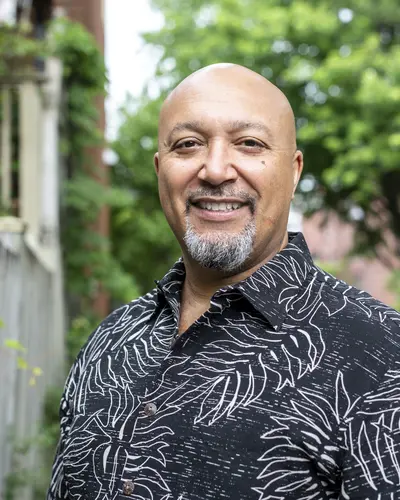
Jason Edward Lewis is a digital media theorist, poet, and software designer. He founded Obx Laboratory for Experimental Media, where he conducts research/creation projects exploring computation as a creative and cultural material. Lewis is deeply committed to developing intriguing new forms of expression by working on conceptual, critical, creative and technical levels simultaneously. He is the University Research Chair in Computational Media and the Indigenous Future Imaginary as well Professor of Computation Arts at Concordia University. Lewis is Hawaiian & Samoan, was born and raised in northern California, and currently lives in Montreal.
Lewis co-directs Abundant Intelligences, the Indigenous Futures Research Centre, Aboriginal Territories in Cyberspace, and the Skins Workshops on Aboriginal Storytelling and Video Game Design. He directed the Initiative for Indigenous Futures and co-directed the Indigenous Protocol and AI Workshops.

Marc Pepin is the Co-Founder of Technocrat AI, a proudly Canadian, Indigenous-owned, and CCIB-certified company delivering responsible AI solutions tailored to sector-specific challenges. With nearly two decades of experience in innovation, investment, and technology, Marc helps organizations grow through expertise in generative AI, predictive modelling, and advanced analytics.
He strongly advocates ethical AI governance and collaborates with leading academic institutions to translate cutting-edge research into practical solutions. Technocrat AI actively develops emerging talent through a robust internship program, supporting accountable and impactful innovation. Marc holds an Honours Bachelor of Commerce and a Master’s in Management of Artificial Intelligence. He received the Queen’s Diamond Jubilee Medal for contributions to Canada and served as President of the MMAI Class at Queen’s University's Smith School of Business.
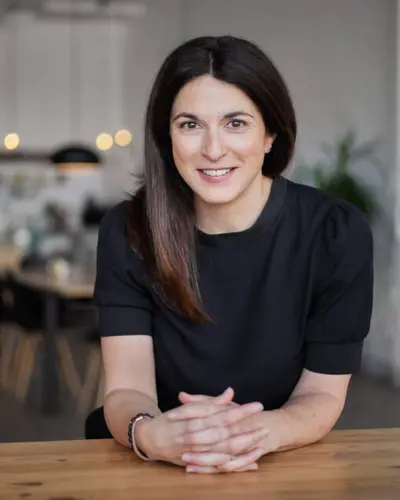
Valerie Pisano is President and CEO of Mila – Quebec Artificial Intelligence Institute. Founded by Professor Yoshua Bengio, Mila is recognized as a global leader in scientific advances that inspires innovation and the development of AI for the benefit of all.
Valerie has 20 years of experience in leadership, strategy and transformation including Chief Talent Officer at Cirque du Soleil as well as cofounder of The Mobïus Bias Project, an initiative focused on diversity and female leadership.
She began her career at McKinsey & Company after a Master Degree in Economics at HEC Montreal, and is a Board Director at Montreal International and at Chartwell.
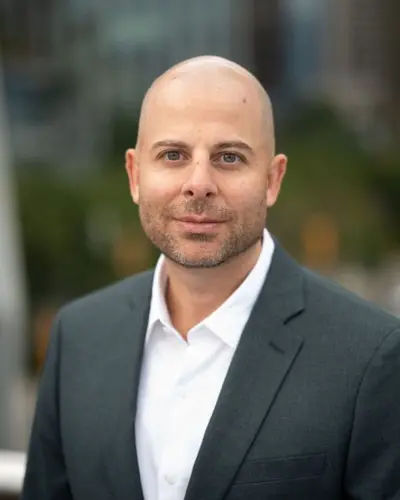
Ryan St. Germaine is a seasoned entrepreneur, AI strategist, and advocate for Indigenous leadership in technology. As the Founder and CEO of the Indigenous Tech Circle, he established Canada’s largest Indigenous-led tech network, fostering growth, collaboration, and innovation among over 400 Indigenous founders, leaders, and changemakers. Now, as Board Chair of the Circle’s non-profit, he leads a 100% Indigenous board focused on strategic vision and impactful programming.
With a career spanning HRTech, EdTech, AI-driven insights, and social recruitment, Ryan has co-founded and led companies like BCjobs.ca and Jobcast to successful exits. His expertise includes AI, product development, marketplace innovation, and purpose-driven community building. As an Executive in Residence with Foresight Canada, New Ventures BC, and Raven Indigenous Capital Partners, he mentors founders on AI, scaling ventures, and community-driven impact. Known for building resilient tech ecosystems, Ryan empowers Indigenous professionals by connecting them to capital, mentorship, and growth.
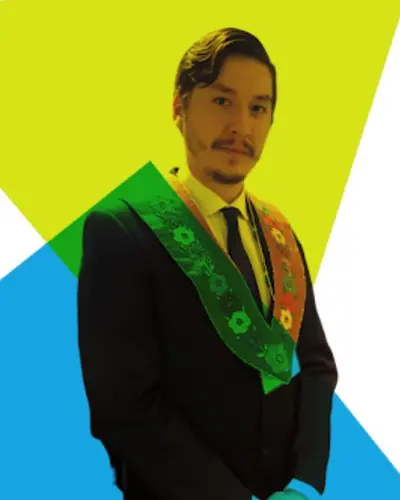
Dana has dedicated over six years of service to the Vuntut and Gwitchin Nation (VGFN), serving as both a council and board member, four of those years as Chief. His tenure was marked by significant achievements, including the defense of the Peel Watershed Land Use Planning provisions in partnership with the Nacho Nyak Dun and Tr’ondëk Hwëch’in nations, and the successful protection of the Porcupine Caribou herd’s calving grounds in Alaska from the Trump administration in 2017.
He has represented Indigenous interests on the global stage, serving as co-chair for the Gwich’in Council International and advancing the Sustainable Development Working Group within the Arctic Council. Under his leadership, the Council of the VGFN passed the internationally recognized declaration Yeendoo Diinehdoo Ji’heezrit Nits’oo Ts’o’ Nan He’aa (After our time how will the world be?) — a first-of-its-kind climate declaration by a modern treaty First Nation in Canada.
Dana’s journey has been anything but conventional. From overcoming trauma and addiction to navigating the halls of international diplomacy, his story is rooted in both survival and resurgence. As a TIME 100 Next leader, Clean50 Emerging Leader, and Up Here Magazine’s Northerner of the Year, Dana has never lost sight of his purpose — to be of service in a good way.
Now, Dana brings this ethos into the realm of Artificial Intelligence. Guided by Indigenous ways of knowing and a lifelong pursuit of understanding, he is exploring AI not as a tool of domination, but as a potential ally in our collective story. His focus lies in aligning AI with Indigenous principles — relationship, respect, and responsibility — while interrogating its impact on sovereignty, data ethics, and the sacred.
Whether in the land, the legislature, or the lab, Dana carries the question forward: After our time, how will the world be?
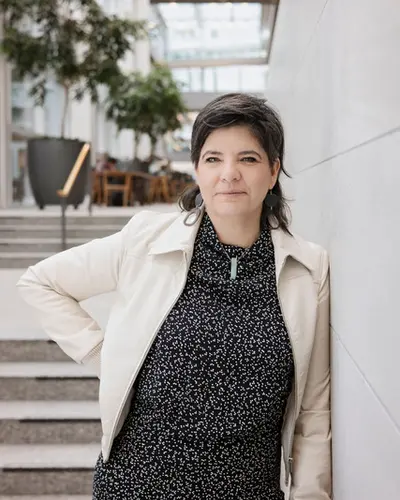
Sara is an experienced executive dedicated to driving positive change and uplifting innovation. With a unique blend of design and strategy expertise, she deeply understands the needs of Indigenous and underserved communities in health, entrepreneurship, and impact investing.
As a registered nurse and midwife, Sara has held various community, primary care, and health system leadership roles in Canada and the UK. Her connections to innovation, tech and AI stem from her experiences leading and developing the Indigenous Innovation Initiative, her work in Indigenous data governance and data sovereignty, and her participation on the AI for Social Good Wisdom Council. She serves as an External Director at McMaster's Wilson College of Leadership and Civic Engagement, a Senior Fellow at the University of Toronto’s Massey College, and an Executive in Residence at the Rotman School of Management.
Day 2 Speakers - July 16
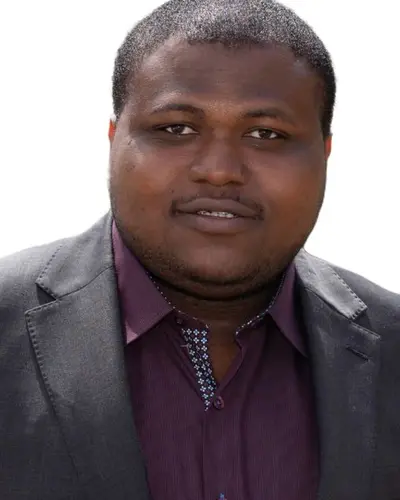
Dr. David Adelani is an Assistant Professor at the McGill University School of Computer Science, a Core Academic Member at Mila - Quebec AI Institute, and a Canada CIFAR AI Chair. Prior to his appointment at McGill University, he was a Postdoctoral or DeepMind Academic Fellow at University College London, United Kingdom.
He received his Ph.D in Computer Science at the Department of Language Science and Technology, Saarland University, Germany in 2023 with a Dr.-Eduard-Martin Outstanding Doctoral Prize. His research interests include multilingual natural language processing and speech processing with a focus on low-resource languages, speech processing. With over 40 publications in leading NLP and Speech Processing venues such as NeurIPS, ACL, EMNLP, and Interspeech, he has made significant contributions to NLP for low-resource languages. Notably, he received a Best Paper Award at COLING 2022 and Best Theme Paper Award at NAACL 2025.
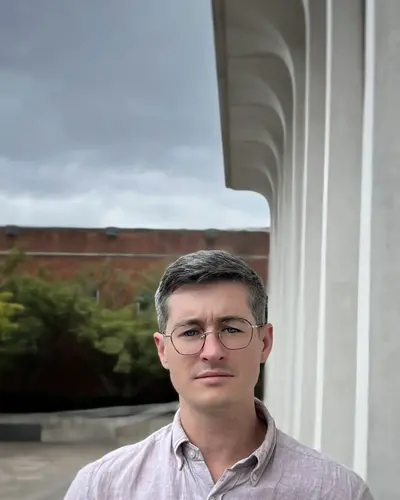
Jonathan Barry is a seasoned policy strategist with experience at the highest levels of government and campaigns in both Canada and the United States. Having served as a trusted advisor to two Canadian Prime Ministers and two Ministers of Defence, he has managed over 20 political campaigns across North America.
Jonathan holds a Master in Public Affairs from Princeton University. In his current role as Director of Policy to Professor Yoshua Bengio, he focuses on the intersection of policy and AI governance and safety, contributing his expertise to initiatives like the International AI Safety Report.
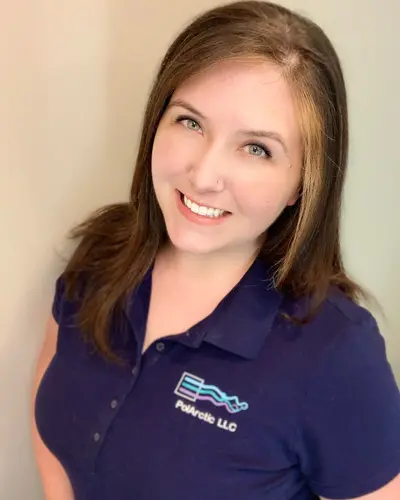
Leslie is the CEO of PolArctic LLC, an oceanography and data science company focused on solving complex challenges in the Arctic. She holds a Master’s in Business Administration (MBA) with a concentration on International Business and is a Veteran of the US Air Force where she served as a commissioned officer. She founded the technology start-up PolArctic LLC based on her experience and passion for the Arctic, and to bridge the gap between science and business requirements.
PolArctic’s AI tools evolve in near real-time to compensate for climate change to support the industries operating in this dynamic environment. Leslie is Yup’ik, Alaska Native, born and raised in Alaska. She was awarded the Women in Artificial Intelligence (WAI) North America Award for AI for Good: Environmental Social Governance (ESG) for 2022, and was listed as a 2021 Forbes Next 1000 entrepreneur.
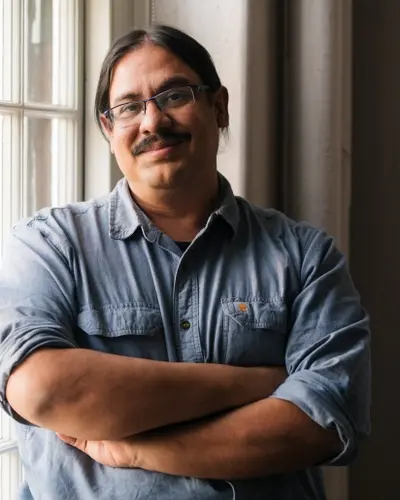
Rolando Coto-Solano is a linguist and computer scientist from Costa Rica. He works as an assistant professor in the Department of Linguistics, and an adjunct assistant professor in the Department of Computer Science at Dartmouth College. He works with Computational Linguistics, doing research on NLP tools to aid in the documentation of Indigenous languages, particularly speech recognition. He has experience working with communities in Polynesia, Costa Rica, Arizona, Mexico and Bolivia.
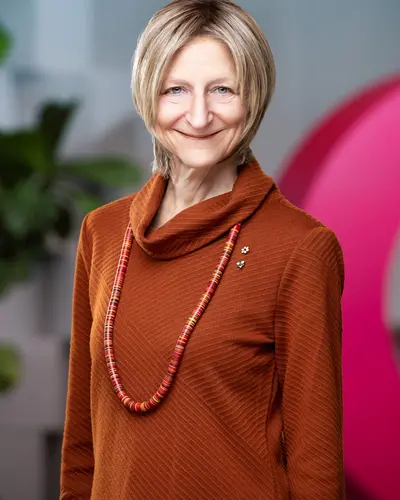
Dr. Sara Diamond, Order of Canada, Order of Ontario, President Emerita OCAD University is University Research Chair and Professor in OCAD U’s the Faculty of Arts and Science. A computer scientist, historian, artist, and designer, Diamond holds deep interest in the relationships of human practices, diverse cultures, and technologies.
Her art works include www.codezebra.net, an early creative neural network that measured and visualized emotion in language patterns. Her cultural sector funded research includes creating the Canadian Cultural Database Catalogue a deep resource for cultural research; qualitative research tools for screen industries; and Crossing Fonds, a digital platform for archival collaboration and data remediation. She is co-PI of the iCity2.0 network applying generative design and procedural visualization to plan complete and equitable communities. She serves as a co-director of Abundant Intelligences: Expanding Artificial Intelligence through Indigenous Knowledge Systems. Diamond is Chair of the Toronto Arts Foundation board and of the Baycrest Academy for Research and Education board.
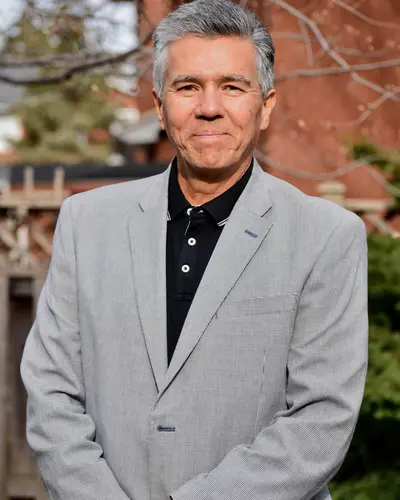
Dr. Mark S. Dockstator is an associate professor at Trent University, Cheney Wenjack School of Indigenous Studies, and former President of the First Nations University of Canada. A member of the Oneida Nation of the Thames, he received his doctorate in law from Osgoode Hall Law School, York University.
Dr. Dockstator has senior leadership experience in both the public and private sector, having served as the founding Chairman First Nations’ Statistical Institute, a federal Crown corporation, Special Advisor to the Royal Commission on Aboriginal People, Director of Mediation and Special Advisor to the Chief Commissioner of the Indian Land Claims Commission, President and CEO of Rama Economic Development Corporation and Senior Negotiator and Researcher for the Assembly of Manitoba Chiefs.
Dr. Dockstator has a great deal of business experience and has a specific research expertise in Indigenous issues, having served as Principal Investigator on an array of national and regional research projects in areas such as health, treaties, languages and culture, education and economic development.
Dr. Dockstator has also served on a number of Boards including Ontario Health, Canadian Institutes of Health Research, Rideau Hall Foundation, Canadian Museum of Nature Foundation and Teach for Canada.
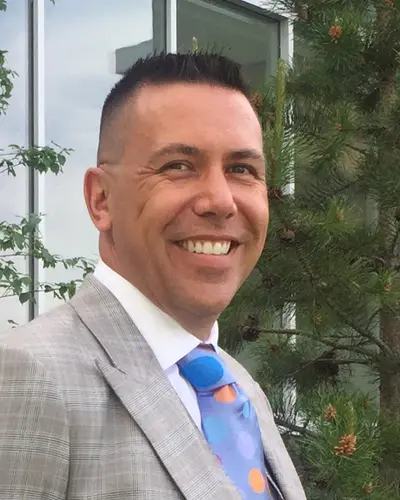
Mick, ᐅᑭᒪᐘᑎᐠ (Okimâwâtik), is a two-spirited citizen of the Okanese First Nation and the first Indigenous Business PhD student at the University of Calgary. Drawing from his experience in the energy industry, Mick studies how institutional structures might be respectfully transformed through Indigenous methodologies.
He hopes to contribute to conversations about how AI technologies can be informed by Indigenous frameworks to help address socioeconomic divides. Through his research on the relationship between Indigenous and capitalist worldviews, Mick aims to learn how technologies might better honor Indigenous Knowledge systems while supporting economic equity for communities. He values the opportunity to participate in discussions about responsible AI development that considers diverse perspectives and prioritizes community wellbeing.
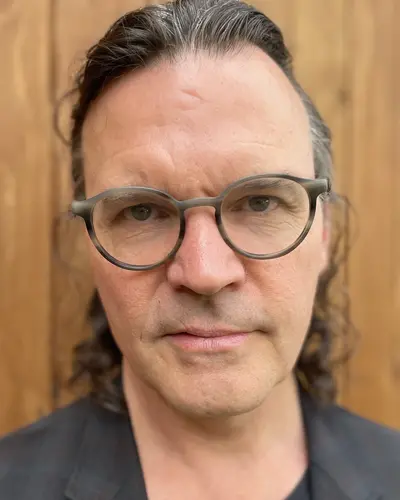
Dr. Aaron Franks is Research Lead for the Data Sovereignty Research Collaborative at the First Nations Information Governance Centre. Aaron’s career spans performance, arts-based research and cultural geographies, and since 2015 advocacy and leadership in “research about research”, the limits of policy, and resisting extraction of First People’s knowledges and relations. Before joining FNIGC he worked at the universities of Manitoba and Queen’s, and was a policy fellow with SSHRC on their approach to TRC call to action 65. He is also a past editor of alt.theatre magazine and holds a PhD in Human Geography (Glasgow).
Originally from Treaty Six territory (Edmonton), he has British, Metis, and Northern European ancestors with ties to the Anglo-Metis communities of St. Andrews, MB, and Birch Hills, SK. A member of the Manitoba Metis Federation, he lives with his family on unceded Algonquin territory (Ottawa).
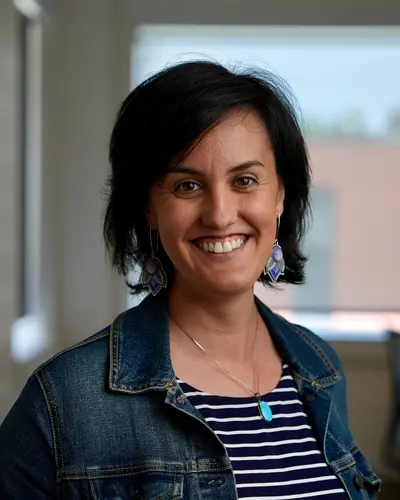
Mary is a Red River Métis PhD candidate in Mechanical & Materials Engineering at Queen's University, where she also earned her master's in Chemical Engineering. A citizen of both the Manitoba Métis Federation and Métis Nation of Ontario, Mary brings a unique perspective to technology innovation rooted in her heritage and upbringing.
After completing her master's degree, Mary gained valuable industry experience at the intersections of science, technology, and engineering before returning to academia. This real-world experience sparked her passion for translating research into tangible impact—a driving force behind her work developing SAIGE.
Mary's journey from industry back to PhD studies reflects her commitment to creating technology solutions that serve communities, particularly in addressing the educational funding challenges faced by Indigenous students across Canada.
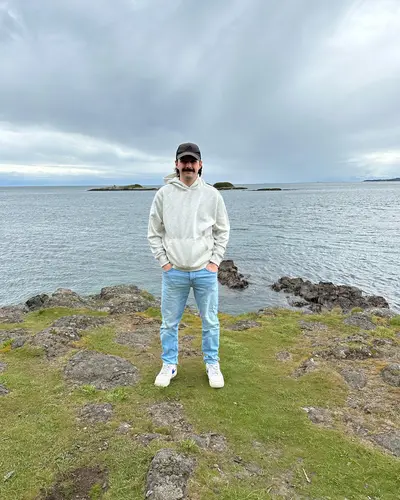
Garrett Hrechka is a proud citizen of the Métis Nation who grew up in Dauphin, Manitoba, on Treaty 2 territory. He is currently studying computer science at the University of Victoria. A lifelong hockey player, Garrett proudly represented Team Manitoba at the National Indigenous Games — an experience that deepened his commitment to teamwork and community.
He is an alumnus of the Indigenous Pathfinders in AI program and the co-founder of SAIGE, an AI-powered scholarship matching tool designed to help Indigenous youth access personalized resources to fund their post-secondary education.
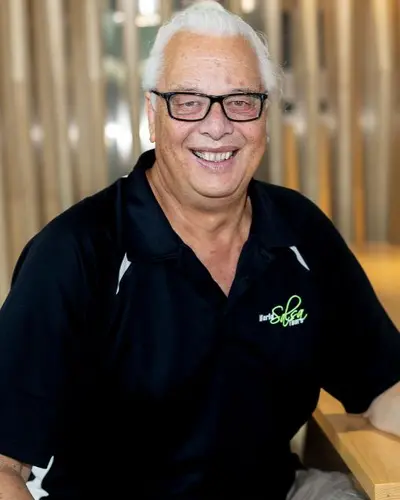
Petera Whaiao Hudson is a PhD candidate at Massey University with a First-Class MSocSci from Waikato University and an MA in Educational Administration from USIS, San Diego. His research explores how Indigenous Knowledge Systems can shape next-generation AI to enhance cultural well-being for Māori whānau.
With extensive experience as a Research Fellow at Waikato and Massey Universities and a Lead Facilitator in early ICT development programmes, Petera combines practical and academic expertise. His leadership in initiatives like Abundant Intelligences and the Future Imaginaries of AI Workshops demonstrates his active role in decolonising AI. Widely published, his work appears in esteemed outlets such as the IEEE Annals of the History of Computing and the Journal of the Royal Society of New Zealand. Petera’s efforts bridge the digital divide between Indigenous and Western systems, contributing significantly to Māori communities and the wider ICT field.
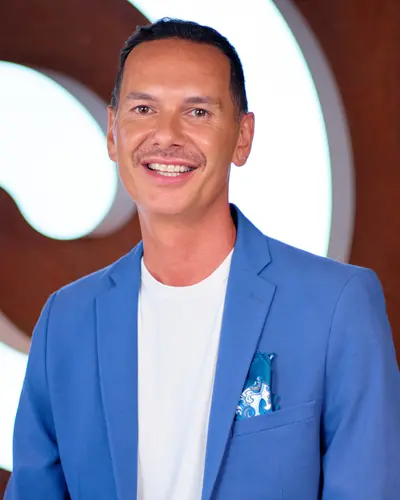
Peter-Lucas Jones is a visionary leader driving Māori language revitalisation through technology and media. As CEO of Te Hiku Media, he leads the development of cutting-edge natural language processing tools for te reo Māori, including speech-to-text, text-to-speech, and Indigenous pronunciation modelling — transforming the digital landscape for Indigenous languages.
A passionate advocate for intergenerational language transmission, Indigenous data sovereignty, and AI-driven language licensing, Peter has positioned Te Hiku Media as a global leader in Indigenous language technology. His expertise in corpus development and AI innovation saw him named to TIME Magazine’s 2024 list of the world’s 100 most influential voices in AI.
Peter-Lucas also holds key governance roles, including Chair of Te Rūnanga Nui o Te Aupōuri, Te Aupōuri Treaty Settlement Trust, and Te Whakaruruhau o Ngā Reo Irirangi Māori, Deputy Chair of Whakaata Māori, and an elected Northland Regional Councillor.
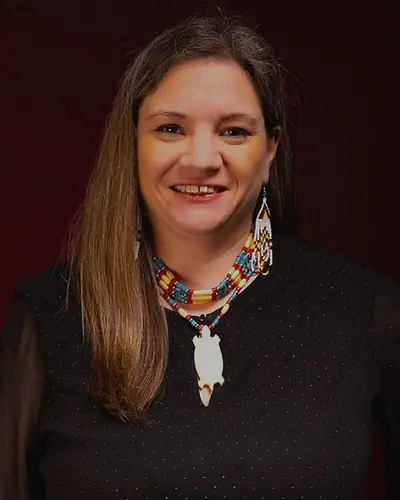
Kristin Kozar, Executive Director of the Indian Residential School History and Dialogue Centre (IRSHDC), proudly honors her Lamalcha Bay ancestry and familial ties to Musqueam, Lummi, Penelakut, and Tsawwassen First Nations. She walks alongside with the Ministry of Indigenous Relations and Reconciliation to enhance access to residential school records for First Nations across British Columbia and Turtle Island.
As a UBC iSchool instructor, she teaches a Master’s course on Indigenous Initiatives in Libraries and Archives and co-leads the Oral Testimony Program, ensuring oral histories remain under First Nations’ control. Her work focuses on Indigenous Data Sovereignty, advocating for Indigenous governance over their data while addressing historical injustices through research on Residential School and Indian hospital records.
With six years of council service, a Master’s in Library and Information Studies, and ongoing PhD studies, Kristin’s leadership reflects her commitment to preserving Indigenous narratives and advancing their rights through collaboration and relationality.
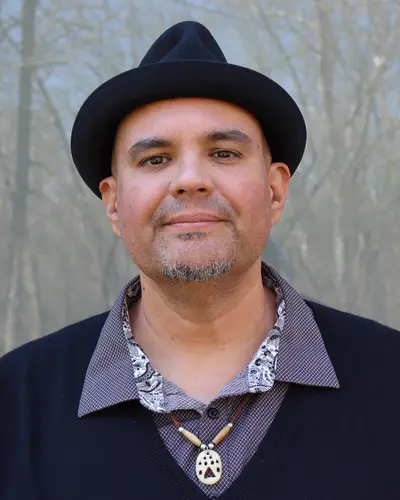
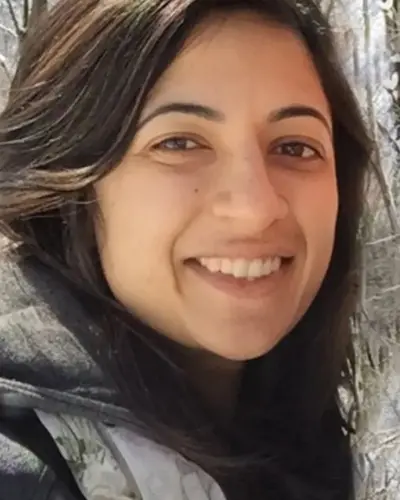
Tegan Maharaj is an Assistant Professor in the Department of Decision Sciences at HEC Montréal. Her research focuses on advancing responsible AI development and applying artificial intelligence to high-impact ecological challenges, including climate change, epidemiology, AI alignment, and ecological impact assessments.
Her recent work explores two key areas: the use of deep learning models for policy analysis and risk mitigation, and the design of datasets or testing environments to evaluate learning behaviors and simulate real-world AI deployment.
She is particularly interested in the factors that shape deep models—not only data, but also the learning environment (such as task design, loss functions, and regularization techniques) and the societal context in which AI systems are deployed, including ethical considerations, human biases, and structural incentives.
Passionate about AI ethics and safety, she is committed to the application of machine learning in environmental management, public health, and social welfare.
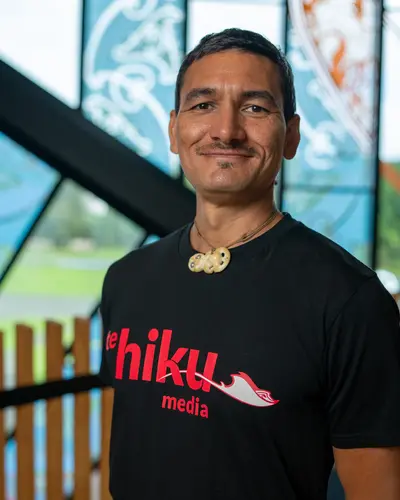
Keoni Mahelona (kanaka ʻōiwi) is the driving force behind the development of digital technologies that aim to protect and promote indigenous languages and knowledge. He makes decisions every day to protect the sovereignty of platforms and data, from the digital and machine learning tools deployed for advanced applications to the storage and sharing of data in culturally appropriate and secure ways.
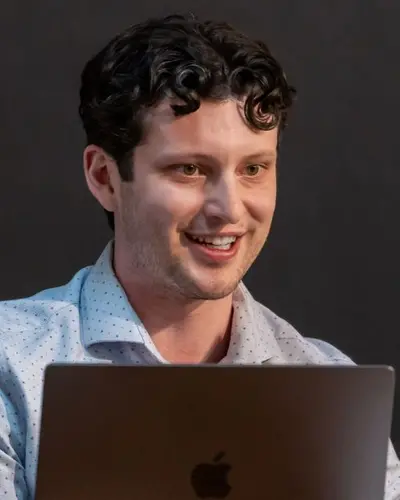
Dane Malenfant is a Métis citizen of the Métis Nation—Saskatchewan, born in North Battleford (Treaty 6) and raised in Regina (Treaty 4.) He is currently completing his MSc in Computer Science at McGill University and Mila – the Québec AI Institute under Dr. Blake Richards in the Learning in Neural Circuits (LiNC) lab. Dane’s research interests explore credit assignment in reinforcement learning agents and neuro-inspired algorithms. His thesis investigated a traditional form of reciprocity as credit assignment problem between multiple agents and led to a new term in the gradient update for learning reliability. Previously, he earned a B.A. in Computer Science (with psychology minor) at McGill and a certificate in French as a Second Language from the University of Regina.
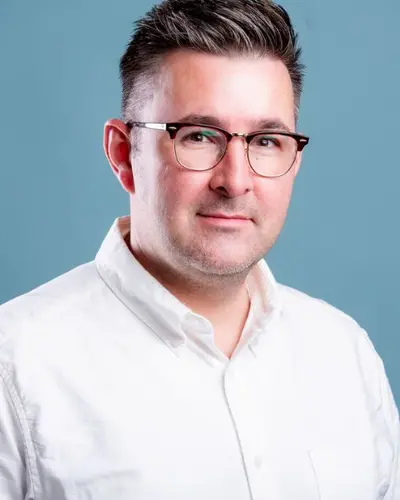
Fenwick McKelvey is an Associate Professor in Information and Communication Technology Policy in the Department of Communication Studies at Concordia University.
He is co-director of the Applied AI Institute and manages the Machine Agencies working group at Speculative Life at the Milieux Institute for Arts, Culture and Technology. He is also a member of the Educational Review Committee of the Walrus Magazine, Director of the Algorithmic Media Observatory, a member of the Center for the Study of Democratic Citizenship, the Groupe de recherche en communication politique, the Canadian Disinformation Network, and the Montréal Society and Artificial Intelligence Collective (MoSAIC).
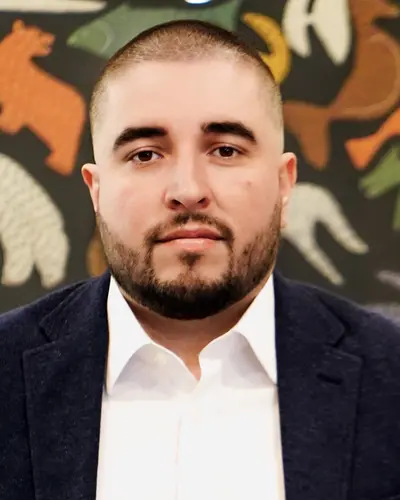
Brandon Meawasige, a member of Serpent River First Nation, holds a Bachelor’s degree in Indigenous Studies from McMaster University and a Graduate Certificate in Digital Marketing from St. Lawrence College. With over 10 years of experience in marketing, communications, and media, he has managed a web design agency in Kingston, Ontario, and held various leadership positions with established technology companies and numerous startups.
Born and raised in Toronto, Brandon also has ties to Alderville First Nation and was a recipient of funding from Indspire’s Building Brighter Futures Program during his undergraduate studies. Through his work at Indspire and his involvement in the community, he is dedicated to advancing Indigenous education and empowering First Nations, Inuit, and Métis youth across Canada. He is currently pursuing a Master of Design (MDes) in Strategic Foresight and Innovation from OCAD University.
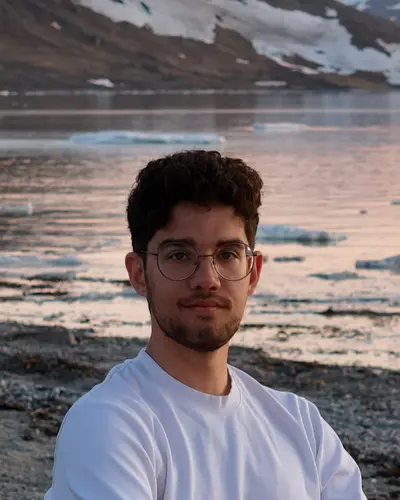
Ali Mehdi serves as Technical lead at Heritage Lab, overseeing AI systems development and platform architecture, focusing on classification systems and local deployment of infrastructure. With a background in applied AI technology and experience launching and managing large-scale AI projects, particularly in the health sector with emphasis on data safety, Ali leads the technical implementation of the ᐁ! (Ai!) Inuktitut language platform.
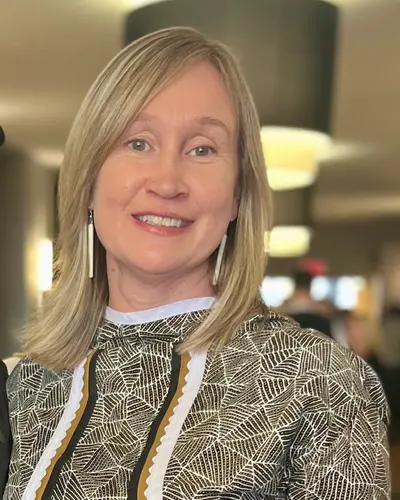
Lisa Mesher is the President of Heritage Lab which is a nonprofit organization who develops Indigenous-led technology for language preservation.
Lisa is an Inuk from Kuujjuaq, Nunavik, Quebec, she currently resides in Montreal. She is a beneficiary of the James Bay and Northern Quebec Agreement. Currently she is the Deputy Director General of Kativik Ilisarniliriniq. She previously held the role of Director of the Post-Secondary Department and the Director of the Adult Education department within Kativik Ilisarniliriniq. Before joining Kativik Ilisarniliriniq in 2013, she worked for 6 years in the Health and Social Services sector as the Associate Director of the Module du Nord Quebecois and as the Director of the Inuit Values and Practices Department for the Nunavik Regional Board of Health and Social Services.
Lisa has held management positions in both the Education and Health and Social Services networks for over 18 years. She is passionate about the advancement and wellbeing of her people.
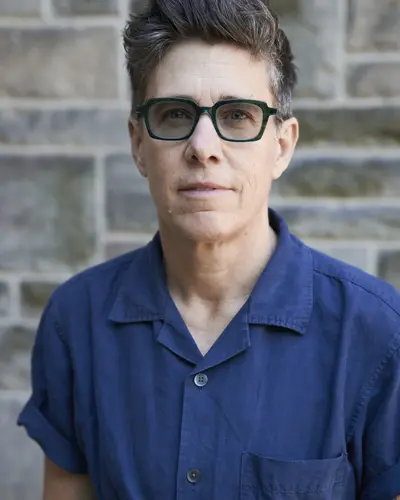
M. Murphy (Red River Métis) works in the field of environmental data justice and Indigenous science and technology studies. They co-direct the Technoscience Research Unit at the University of Toronto which is home to the Environmental Data Justice Lab, which is focused on community-based research in Aamjiwnaang First nation ; the Indigenous Science and Ethical Substance Lab; and the Indigenous Science, Technology and Environment Research Hub.
They are involved in two large projects involving AI, the first explores AI for building Indigenous place-based tools for chemical risk assessment, the second is bringing Indigenous perspectives to the development of AI driven self driving labs for substance discovery and testing. They are a Canada Research Chair in Environmental Data Justice and Science and Technology Studies, and Professor of the School of Environment as well as the Women and Gender Studies Institute.
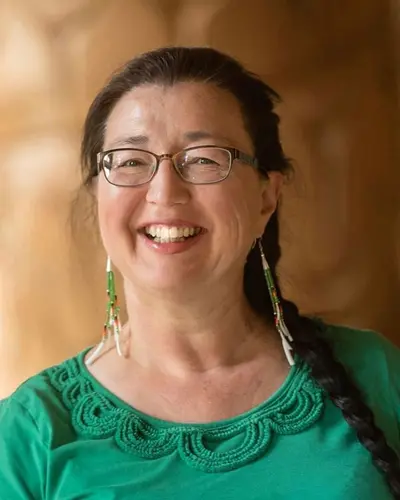
Caroline Running Wolf née Old Coyote (Crow) is a language activist and XR producer dedicated to supporting Indigenous languages and data sovereignty. Caroline co-founded First Languages AI Reality (FLAIR) and serves on multiple advisory boards where she champions the inclusion of Indigenous knowledges.
Caroline is an advocate for Indigenous data sovereignty, data justice, and AI ethics. Caroline’s PhD research at University of British Columbia in Vancouver, Canada partners with Kwakwaka'wakw communities and explores applications of immersive technologies (AR/VR/XR) and artificial intelligence (AI) to enhance Indigenous language and culture reclamation.
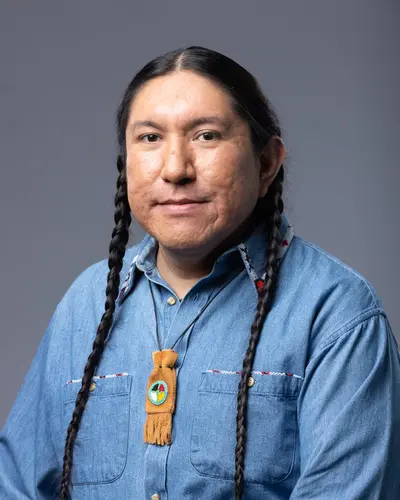
Co-Founder, IndigiGenius & Lakota AI Code Camp | Advocate for Indigenous Tech Sovereignty
Michael Running Wolf (Northern Cheyenne/Lakota/Blackfeet) was raised in a rural prairie village with intermittent water and electricity on his mother’s reservation in Montana; naturally he now has a Master of Science in Computer Science. He is a published poet but a computer nerd at heart with professional experience as an engineer for IBM, AT&T Wireless, Lawrence Livermore National Lab, and Amazon’s Alexa. Michael was faculty at Northeastern University and is the Vice-President of Software Systems at an AI startup. Michael is also FLAIR’s lead architect.
Michael is an AI ethicist who envisions an Indigenous future where Indigenous communities, alongside reclaiming their languages, attain technological sovereignty while addressing data ownership and systemic barriers to Indigenous AI. He is co-author of the Indigenous Protocol and Artificial Intelligence Position Paper, co-founder and Board President of IndigiGenius, co-founder of the Lakota AI Code Camp (LAICC), as well as co-founder and Lead Architect of First Languages AI Reality (FLAIR). He is a 2024-25 The Tech for Global Good Laureate and, among other awards, his work researching an automatic speech recognition system for highly polysynthetic languages has been recognized with the Patrick J. McGovern AI for Humanity Prize.
Michael serves on industry advisory boards, is invited as keynote speaker and to events at the United Nations as well as the US and Canadian governments. In his applied research, consultant work, and speaking engagements, Michael is an advocate for Indigenous ways of knowing, data justice, and AI ethics, contributing to the ecology of thought represented by the Indigenous. (https://www.linkedin.com/in/runningwolf)
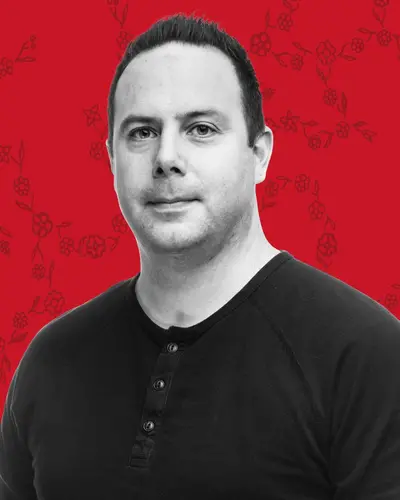
Jeff founded Animikii in 2003 and has orchestrated and managed its growth ever since. Everything Jeff does in business is geared toward uplifting his family, communities and Indigenous Peoples. He is Ojibwe and Métis, originally from Manitoba, and now lives and works in Victoria, BC on Lekwungen territory. Jeff is a software developer, product designer, author, and speaker. He also serves on the OECD Global Partnership on AI (GPAI) Experts Working Group on Responsible AI. Jeff has served on the board of Aboriginal Peoples Television Network (APTN) and its subsidiaries since 2018.
“It’s an exciting time for the Indigenous movement. We’ve begun a new era of Indigenous-settler relations and the long journey towards Reconciliation has just begun. Each and every one of us, Indigenous and non-Indigenous alike, has been called upon to honour the past, to do better, and to rise up. Warriors everywhere are rising up in the fight for equitable outcomes for Indigenous people. We at Animikii believe that our call-to-action is to support all of these warriors in their journey by using the tools available to us. Our answer to that call, our weapon and tool of choice, is technology.”
Masters of Ceremonies
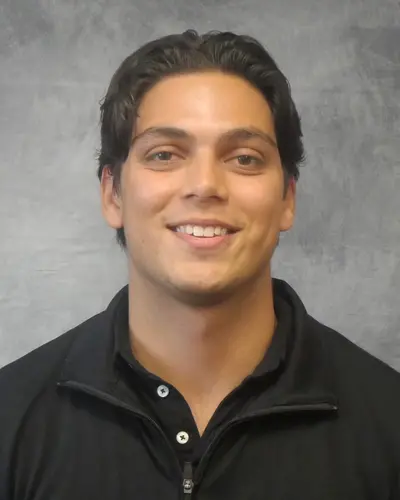
Drake D’Souza is a Kahnawà:ke Mohawk working in community workforce development. He holds a BComm from Concordia and is completing an MA in Educational Leadership at McGill. He’s passionate about creating opportunities for Indigenous talent and bringing positive energy as your MC.
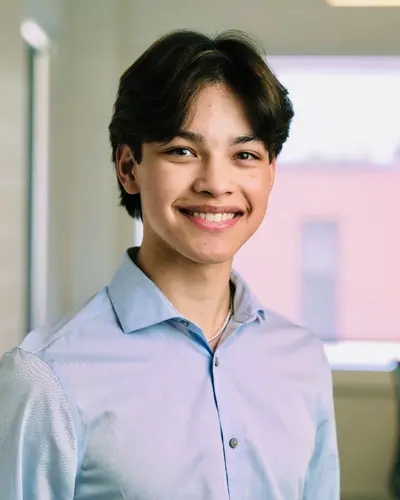
Kowen Woo is an alumnus of the Indigenous Pathfinders in AI program and an AI honors student at the University of Alberta. Through research internships at institutions including Mila and Borealis AI, he has gained experience in cutting-edge AI development. As an indigenous student in technology, he is committed to increasing representation in the tech industry and exploring how Indigenous values can be incorporated into AI fundamentals.


